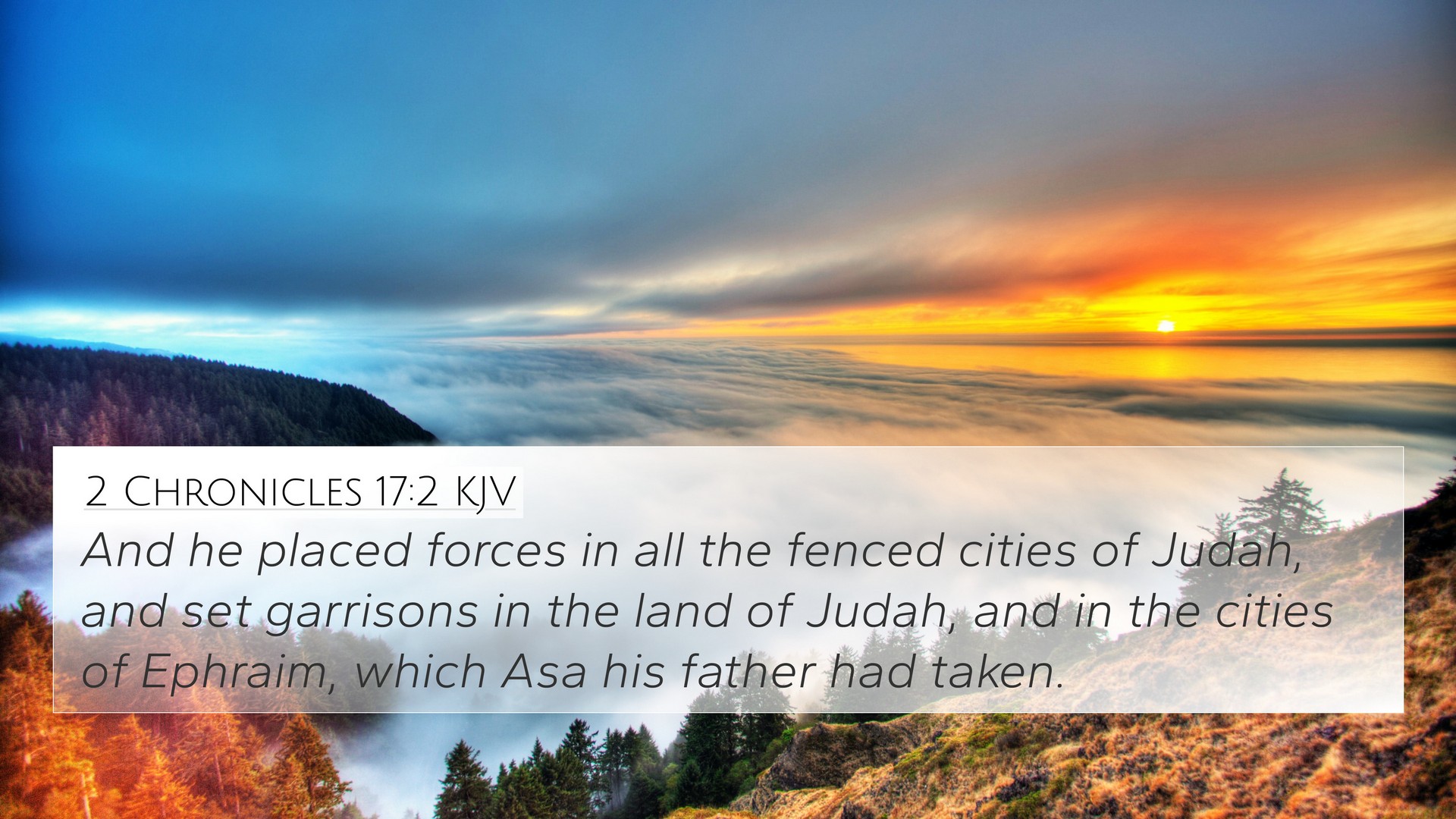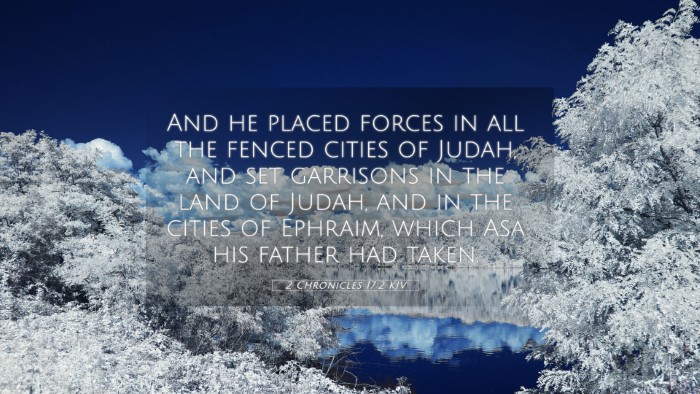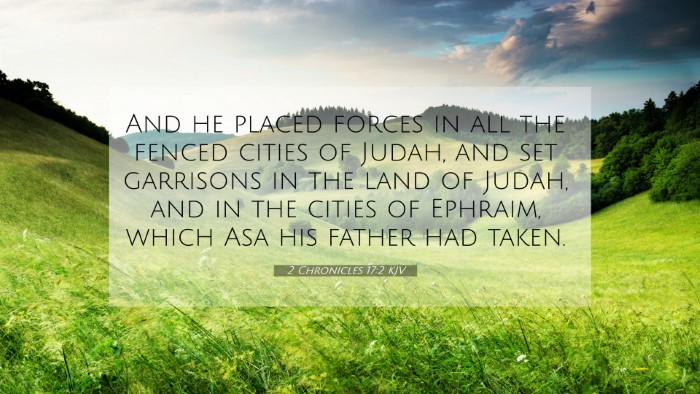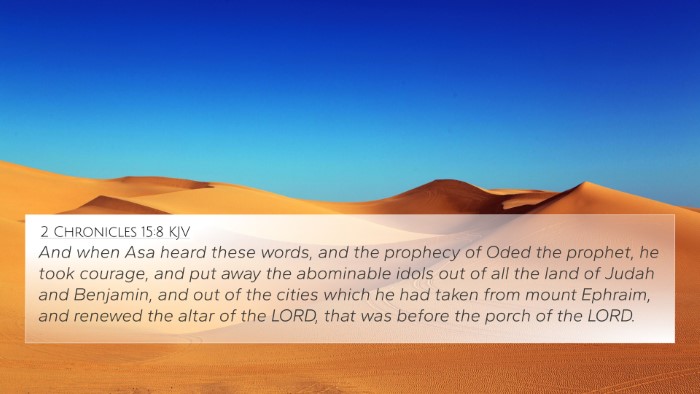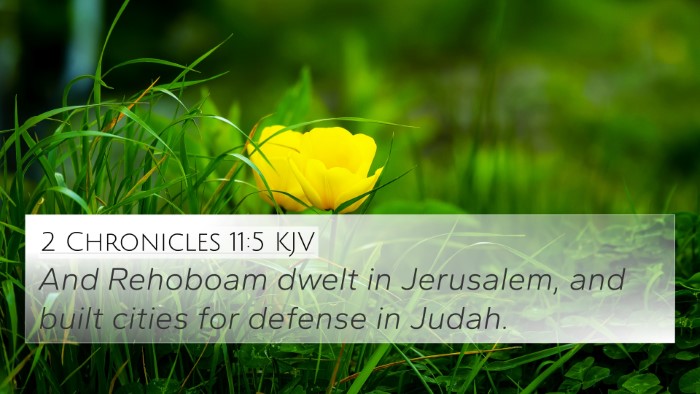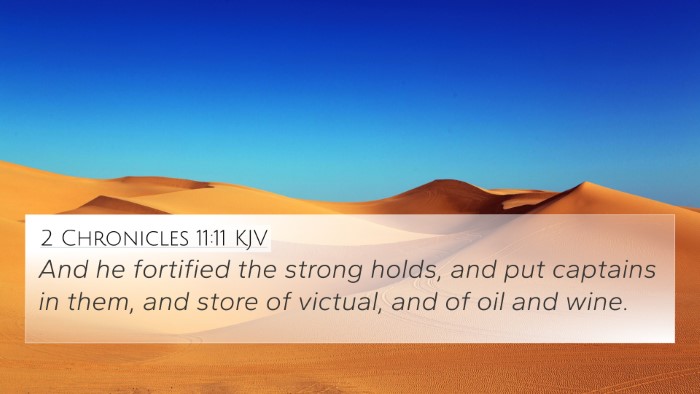Understanding 2 Chronicles 17:2
This passage details an important moment in the reign of Jehoshaphat, king of Judah. It encapsulates a significant transition within the kingdom's governance and the spiritual state of Israel at the time.
Verse Context
2 Chronicles 17:2 states:
"And he placed forces in all the fortified cities of Judah, and set garrisons in the land of Judah, and in the cities of Ephraim, which Asa his father had taken."
Verse Meaning
This verse illustrates Jehoshaphat's military and strategic foresight.
- Militaristic Defense: Jehoshaphat fortified cities, enhancing the kingdom's defensive capabilities against external threats. This action demonstrates a commitment to safeguarding the realm.
- Spiritual Leadership: His measures reflect a leadership style that balanced military readiness with spiritual vigilance. The connection to Asa, his predecessor, underscores a continuity of righteous governance.
- Strategic Governance: By establishing garrisons in previously conquered territories, Jehoshaphat ensured stability and control across the kingdom, vital for maintaining peace and order.
Commentary Insights
Insights from various public domain commentaries provide a deeper understanding of this verse:
Matthew Henry: Henry emphasizes the importance of preparation in governance, noting that Jehoshaphat's actions were in line with wisdom and foresight, making proactive measures to defend the faith and the people.
Albert Barnes: Barnes points to the historical context of Jehoshaphat’s reign, suggesting that his military buildup was prompted by external threats and aimed at ensuring peace and stability in Israel.
Adam Clarke: Clarke highlights the spiritual implications of Jehoshaphat's military actions, suggesting they were not merely for protection but served as a means to secure the worship practices and religious adherence of the people.
Cross-References
To better understand 2 Chronicles 17:2, here are relevant Bible verse cross-references that illuminate its themes:
- 2 Chronicles 14:6-7: Discusses Asa's fortification efforts, showing continuity in military preparations among Judah’s kings.
- 2 Chronicles 20:4: Highlights the role of prayer and seeking God's guidance amidst threats, reflecting Jehoshaphat's spiritual leadership.
- Isaiah 33:20-21: Provides insight on the security of Zion and God's protection, connecting Judah's physical defenses with spiritual assurance.
- 1 Kings 22:1: Explores the period of peace during Jehoshaphat’s reign, supporting the connection between military strength and internal calm.
- Psalms 127:1: "Unless the LORD builds the house, those who build it labor in vain," connecting spiritual dependency with physical efforts.
- Proverbs 21:31: “The horse is made ready for the day of battle, but victory belongs to the LORD,” emphasizing trust in divine protection alongside military readiness.
- 2 Chronicles 17:10: Mentions Jehoshaphat's efforts to teach the law of the Lord, showcasing the integrated approach of spiritual and military leadership.
Connections with Other Scriptures
The interconnections between this verse and others reveal a deeper thematic unity throughout the Bible:
- Linking to Joshua 1:9: Both verses emphasize strength and courage in leadership, underlining the importance of divine presence in leadership endeavors.
- James 5:16: Relates to the power of prayer for nations, underscoring spiritual vigilance alongside physical defenses.
Biblical Themes
Key themes emerging from this passage include:
- Leadership: The responsibilities of a ruler in both physical and spiritual domains.
- Faith and Trust in God: Emphasizing reliance on divine support even amidst preparations for battle.
- Continuity of Righteousness: Echoes the importance of maintaining godly principles across generations.
Conclusion
In conclusion, 2 Chronicles 17:2 offers a rich tapestry of insights into the nature of leadership, preparedness, and the necessity of intertwining faith with societal governance. Understanding this verse within its broader biblical context helps to illuminate the multifaceted dynamics of Jehoshaphat's reign and God's overarching sovereignty.
Further Study Suggestions
For further understanding, consider utilizing:
- Bible concordance tools to explore related themes.
- Cross-reference guides to unveil deeper connections between scriptures.
- Comprehensive Bible cross-reference materials to track thematic consistencies.
